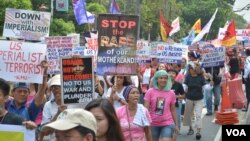MANILA —
A pending agreement for more American troop rotations to the Philippines continues to have strong support in the country, which is facing territorial challenges from an increasingly assertive China. But in the days leading up to President Barrack Obama’s visit to Manila, some opponents are being more vocal.
The Philippines military, business sector and local media generally have a favorable view of a proposal that would see more American military ships and planes stopping in the Philippines. But the mostly left-leaning groups who oppose it point to historical grievances.
Renato Reyes, Secretary General of the New Patriotic Alliance party and organizer of anti-American protests ahead of Obama’s visit, said since the late 1800’s when the U.S. colonized the Philippines, American troops have had a major presence in the country. Reyes said historically Philippine laws have had “no teeth” when U.S. military were found to be in violation.
“The pattern is that they always find a way to circumvent our laws and to place themselves above Philippine laws and in the process they practically violate our sovereignty. So this agreement that they are going to sign brings back a lot of those old problems of when we had U.S. bases in the country,” Reyes said.
American military outposts have been in the Philippines since colonial times and after World War II they were expanded. But in 1991, the Philippine Senate moved to shut them down in response to strong domestic pressure. Reyes says hosting the U.S. military “violated our sovereignty, left a lot of toxic waste that has not been cleaned up [even] until now and worsened prostitution.”
In 1999 the country entered into a visiting forces agreement with the U.S., which has since sent regular rotations to the country’s south to train local troops in counterterrorism tactics.
Philippine negotiators say under the proposed new arrangement there would be no permanent U.S. bases, in accordance with the Philippine constitution. And the accord would not last longer than 20 years. They also pushed for access to whatever temporary structures Americans have within Philippine outposts.
That has not appeased opponents. The secretary general of the women’s rights group Gabriela, Joms Salvador, said the agreement amounts to “strategic basing” for the U.S. which has set its policy sites on Asia, where China’s military continues to grow.
“We are deeply concerned that this whole thing is getting the Filipino people dragged into… the military power-play that the U.S. is doing and it’s also inviting the danger of war to our people,” Salvador explained.
The Philippines, which is perceived by many to be militarily weak, is in a heated territorial row with China about a number of small islets in the resource-rich South China Sea. And there is some strong support for having the U.S. around to counter China’s stepped up assertion of its claim to nearly the entire sea. Brunei, Malaysia, Taiwan and Vietnam also have claims in the region.
Management Association of the Philippines Vice President Rafael Alunan said in recent years China has kept the Philippines out of three economically vital shoals and reefs that are within the country's 370 kilometer exclusive economic zone.
“I personally welcome that new security pact because it will help our country protect its honor, territory and resources as we strive to build up our national defense in the face of the clear and present danger that China has been posing to the region,” said Alunan.
Manila-based political analyst Ramon Casiple said the usual voices that speak out against U.S.-Philippines military ties do have the support of the head of the Senate Foreign Relations Committee who wants to review the agreement.
“There are serious arguments there like the nationalist argument, the prostitution problem, the usual impact, basically, on internal politics here. But I don’t think they are of a proportion that can threaten the agreement itself,” stated Casiple.
The agreement, which will not need Congressional approval, is expected to be signed during Obama’s visit next week. Renato Reyes said once the details are made public, opponents plan to file a petition against it with the Supreme Court.
The Philippines military, business sector and local media generally have a favorable view of a proposal that would see more American military ships and planes stopping in the Philippines. But the mostly left-leaning groups who oppose it point to historical grievances.
Renato Reyes, Secretary General of the New Patriotic Alliance party and organizer of anti-American protests ahead of Obama’s visit, said since the late 1800’s when the U.S. colonized the Philippines, American troops have had a major presence in the country. Reyes said historically Philippine laws have had “no teeth” when U.S. military were found to be in violation.
“The pattern is that they always find a way to circumvent our laws and to place themselves above Philippine laws and in the process they practically violate our sovereignty. So this agreement that they are going to sign brings back a lot of those old problems of when we had U.S. bases in the country,” Reyes said.
American military outposts have been in the Philippines since colonial times and after World War II they were expanded. But in 1991, the Philippine Senate moved to shut them down in response to strong domestic pressure. Reyes says hosting the U.S. military “violated our sovereignty, left a lot of toxic waste that has not been cleaned up [even] until now and worsened prostitution.”
In 1999 the country entered into a visiting forces agreement with the U.S., which has since sent regular rotations to the country’s south to train local troops in counterterrorism tactics.
Philippine negotiators say under the proposed new arrangement there would be no permanent U.S. bases, in accordance with the Philippine constitution. And the accord would not last longer than 20 years. They also pushed for access to whatever temporary structures Americans have within Philippine outposts.
That has not appeased opponents. The secretary general of the women’s rights group Gabriela, Joms Salvador, said the agreement amounts to “strategic basing” for the U.S. which has set its policy sites on Asia, where China’s military continues to grow.
“We are deeply concerned that this whole thing is getting the Filipino people dragged into… the military power-play that the U.S. is doing and it’s also inviting the danger of war to our people,” Salvador explained.
The Philippines, which is perceived by many to be militarily weak, is in a heated territorial row with China about a number of small islets in the resource-rich South China Sea. And there is some strong support for having the U.S. around to counter China’s stepped up assertion of its claim to nearly the entire sea. Brunei, Malaysia, Taiwan and Vietnam also have claims in the region.
Management Association of the Philippines Vice President Rafael Alunan said in recent years China has kept the Philippines out of three economically vital shoals and reefs that are within the country's 370 kilometer exclusive economic zone.
“I personally welcome that new security pact because it will help our country protect its honor, territory and resources as we strive to build up our national defense in the face of the clear and present danger that China has been posing to the region,” said Alunan.
Manila-based political analyst Ramon Casiple said the usual voices that speak out against U.S.-Philippines military ties do have the support of the head of the Senate Foreign Relations Committee who wants to review the agreement.
“There are serious arguments there like the nationalist argument, the prostitution problem, the usual impact, basically, on internal politics here. But I don’t think they are of a proportion that can threaten the agreement itself,” stated Casiple.
The agreement, which will not need Congressional approval, is expected to be signed during Obama’s visit next week. Renato Reyes said once the details are made public, opponents plan to file a petition against it with the Supreme Court.












